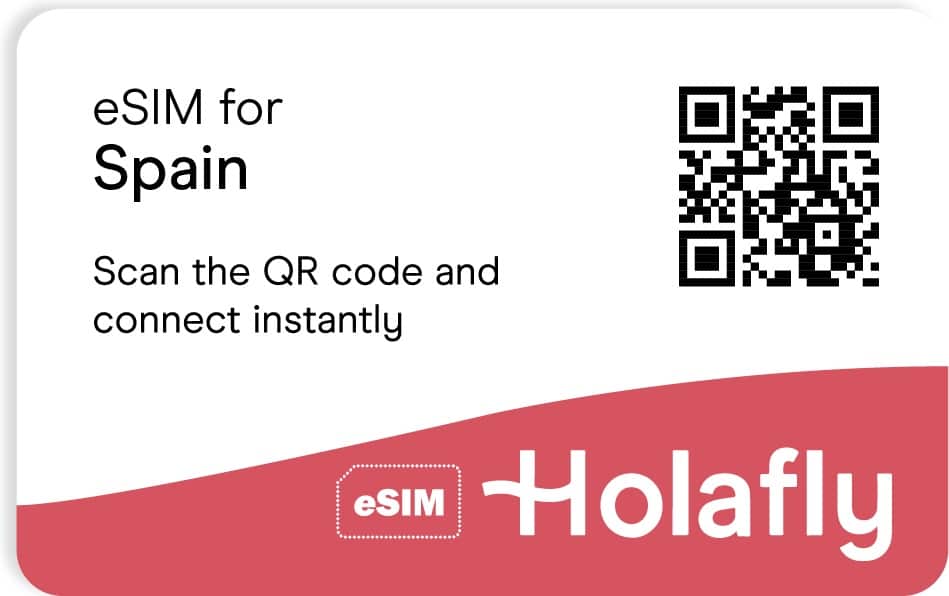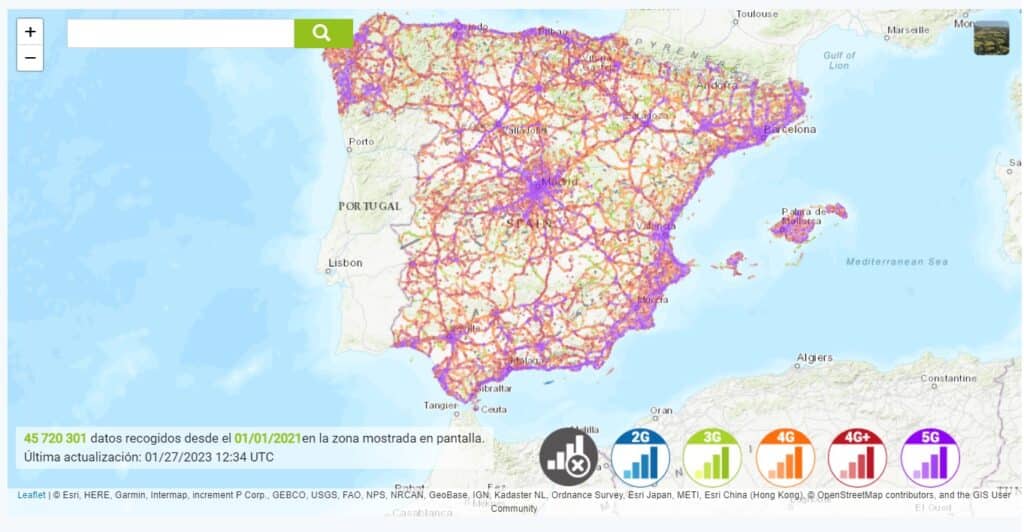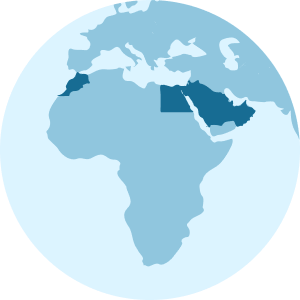Digital Nomad Visa in Spain: Requirements and how to get it
Find out how it works and how to apply for a digital nomad visa in Spain, including the advantages for remote workers.
If you’re looking for a destination with a visa for digital nomads, Spain is precisely one of the countries that recently joined the list of nations that have developed a new visa category in their immigration legislation to expedite entry and residence authorization of foreigners interested in working remotely in the country.
So, if you would like to know more details about this visa, for which you can already apply for starting 2023, stay tuned to know how it works, what the requirements are, how you can apply, and what resources digital nomads need to have internet and make Spain your new workspace.
What is it to be a digital nomad?
Although the concept is already known worldwide, it refers to a new lifestyle that promotes minimalism and remote work, taking advantage of the new information and communication technologies; together with the tourist visas that digital nomads use to live and work for certain periods in different countries.
Why do digital nomad visas exist?
In response to the needs of today’s world, digital nomad visas were developed to grant special residence and work permits, for long periods, to digital workers, allowing them greater mobility and benefits when it comes to fulfilling their daily tasks, while they travel the world.
In fact, for several years, digital nomadism has become a lifestyle for many people. But it’s in 2020 when it gathers momentum, after the effects of the recent pandemic. That is when the governments of different countries recognized the importance of creating immigration laws that favor this type of travel within their territories.
Visa for Digital Nomads in Spain, how does it work?
Surely, digital nomad visas work differently in each country. In particular, in Spain and according to information consulted on the BOE.es portal, the visa for digital nomads was developed to establish a new visa category for international workers, allowing them to:
“The visa allows entry and residence in Spain for a maximum of one year while its holders work for themselves or employers anywhere in the world. In addition, foreigners who are already in Spain regularly and want to telework or continue teleworking (because they own a visa) in Spain, may apply for authorization for a maximum period of three years, renewable for a period of two years. Once they reach 5 years of legal residence in Spain and meet these requirements, they can apply for a long-term authorization.”
«(translation of the information published in the Official State Gazette)», December 22, 2022.
Indeed, with this new initiative, stated in the Entrepreneurs Law (better known as the Startup Law), the Spanish government seeks to attract qualified talent and international investment to strengthen the national economy. But also, as part of its strategic plan to lead the ranking of countries with the greatest talent, innovation, and digital entrepreneurship.
Advantages of the Spanish visa for digital nomads
- Travel freely around the country, without risk of rejection
- Prompt visa approval process
- Permit to work legally for one year (with the possibility of extension)
- Benefits in the payment of taxes
- A path to obtain a permanent residence permit
- Possibility of including the family for a future residence visa
- Enjoy remote work with different landscapes and weather seasons.
Disadvantages of the Spanish visa for digital nomads
- Doesn’t apply to citizens residing in Spain
- Applies to ventures that are not older than five years
- You can work for Spanish companies, without exceeding 20% of your annual income.
Who can apply for the new digital nomad visa?
- Any person, of legal age, who is not a citizen of the European Union
You must prove a real professional relationship with a foreign company - Have health insurance with full coverage throughout Spain
- You can’t have a criminal record.
Requirements to apply for the new Spanish visa
So, to process the Spanish visa for digital nomads you have two options: You can apply directly in Spain, or through the Spanish consulate in your home country or residence.
In both cases, the following requirements must be met:
- Fill out and sign the international mobility form (link in Spanish)
- Present a copy of your full passport
- Pay the corresponding administrative fee 790 038, at $10.72 USD
- Submit proof of a clear criminal record from the country you have lived in for the past 2 years
- Submit a declaration of no criminal record for the last 5 years
- 3 white background passport photos
- Bank statements to show that you have an income between $2.100 and $3.000
- Professional accreditation that you’ve been working for your company or having a freelance relationship with your clients for at least 3 months
- Foreign company accreditation authorizing remote work in Spain, indicating profile, salary, terms, and conditions of the professional activity
- Proof of remote work for a consecutive year, with foreign companies or clients
- Copy of the professional qualification related to the position, or substitute experience in functions similar to the position to be held (official documents with apostilles)
- Sign up for Spanish social security, or medical service coverage, valid in Spain
*Translation of the information consulted on the official immigration online portal of the Spanish government (in Spanish).
Equally important, if you process the visa with the Consulate, the response can take between two and three months to obtain the final decision. On the other hand, when carrying out the procedure directly in Spain, it will take approximately 20 business days.
In like manner, here we share the list of Spanish embassies and consulates around the world (in Spanish). You only have to choose the country of origin, or residence in the last two years to submit the required documentation if you are outside of Spain.
Duration of the Spanish visa for digital nomads
This visa will be valid for 12 consecutive months. However, the holder may be absent for a maximum period of 6 months to avoid losing said authorization. After one year, remote workers may request a residence permit, valid for three years (renewable), as mentioned above.
Why is Spain one of the best destinations for remote work?

If you’re a digital nomad, you’ll have the best memories of your time in Spain and you will want to apply for this visa because the cost of living is favorable, compared to other countries on the European continent. Or also because you want to continue enjoying the weather, the beaches, working outdoors, or its beautiful landscapes.
But this time, we want to show you other benefits that digital nomads get with the new Spanish visa:
Benefits in tax payment
Considering that Spain wants to become one of the global digital talent hotspots, it has authorized important tax benefits for foreign workers, under the Startup Law.
Of course, this includes the payment of non-resident income tax (IRNR), which means that they will have to pay a reduced rate of 15% on their income; and not 24% as stipulated for residents of this country. In addition, this tax regime also seeks to benefit families that are economically dependent on the e-worker.
Internet coverage and connection
Currently, the country has internet and cellphone coverage in a large part of the Spanish territory. For example, when you visit cultural centers, libraries, cafés, restaurants, or different public places, you find WiFi hotspots to connect to the internet for free.
In addition, there are other ways to connect to the internet in the country, through private networks that offer better security, such as the eSIM for Spain with data, prepaid SIM cards, or Pocket WiFi, to stay connected and work remotely with no excuses.
How do digital nomads in Spain connect to the internet?
As we have just mentioned, there are multiple alternatives to connect to the internet. And this is precisely one of the reasons why Spain has become one of the favorite destinations for digital nomads to work remotely in the country. Let’s see some examples:

Data eSIMs are great allies for connecting in Spain, considering that in addition to providing cellular internet, they allow users to keep their WhatsApp number to keep in touch with family, friends, or co-workers.
Moreover, they provide a stable high-speed connection and good coverage. This is thanks to its connection to different Spanish Carriers’ local internet and cellular networks. For example, the Holafly eSIM connects with the Movistar Spain cellular network, offering coverage throughout the state, as shown in the following image:

If you still don’t know what is an eSIM card, it’s a chip that is already embedded into the latest generation of smartphones. Indeed, it works just like a SIM card and it’s the most recent evolution of the plastic chips that we use in our smartphones to make calls, send messages, and browse on the cellphone.
The difference is that these eSIMs provide data for browsing at a much lower price than the international roaming service that travelers use to get these services anywhere else in the world. The chances of getting an eSIM Portugal, which is close to Spain, are quite high for digital nomads!
In Spain, eSIM is very common; it has become the most popular option for travelers due to the ease of purchase and use, so people find an alternative to having internet whenever they need it without having to sign up or register.
Nowadays, the Holafly eSIM also allows people to share mobile data! With this feature, travelers can share up to 500 MB per day.
But, if you want additional information about the Holafly data eSIM for Spain, visit this link.
SIM card to have internet in Spain
Now that you will be living in Spain for a long period, you can subscribe to a postpaid plan or buy a SIM card to top it up every time you need to make calls, send SMS, and consume cellular data.
Undoubtedly, it’s the second-best alternative used by digital nomads in Spain through the main internet and cellular phone providers in the country, such as MásMóvil, Movistar, Orange, and Vodafone, among others.
Pocket WiFi to have internet in Spain
Pocket WiFi is a portable device the size of a smartphone that helps you get internet anywhere. A recommended option for digital nomads traveling in a group, since Pocket WiFi allows multiple devices to be connected to the internet simultaneously.
Other countries that also have a visa for digital nomads
Estonia was the first country to offer a digital nomad visa in the world. Since then, the list of countries has not stopped growing. Currently, there are around 40 countries that have this new category in their legislation, allowing thousands of people to work in different places, without the worries they used to have with tourist visas, due to time constraints.
List of countries with visas for digital nomads
- Anguilla
- Antigua and Barbuda
- Aruba
- Barbados
- Bermuda
- Brazil
- Cabo Verde
- Cayman Islands
- Cyprus
- Czech Republic
- Colombia
- Costa Rica
- Croatia
- Curaçao
- Dominica
- Dubai
- Ecuador
- Estonia
- Germany
- Georgia
- Grenada
- Greece
- Hungary
- Indonesia
- Iceland
- Italy
- Letonia
- Malaysia
- Malta
- Mauritius
- Mexico
- Norway
- Panama
- Portugal
- Romania
- Spain
- Thailand
FAQs about the visa for digital nomads in Spain
Any person, of legal age, who is not a citizen of the European Union. In addition, they must have a clean criminal record and proof of a real employment relationship with a foreign client or company.
No, it’s recommended to go to the official migration website in each country to check the requirements to apply.
With the new Spanish visa for digital nomads, remote workers have tax benefits. For example, they may pay the non-resident tax, at a lower rate than what resident citizens usually pay.
Yes, the idea is that at the time of applying for the new visa, you are a Spanish social security affiliate or have medical insurance coverage, valid in Spain.
Plans that may interest you















































 Pay
Pay  Language
Language  Currency
Currency 


















 No results found
No results found













